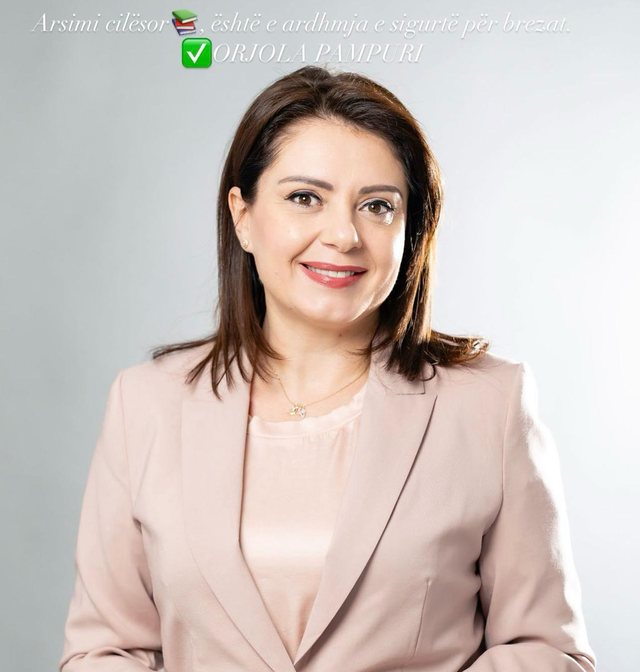
Orjola Pampuri: When universities survive on student fees and without support for scientific research, we cannot expect quality or innovation


The Euro-Atlantic Coalition's candidate for MP, Orjola Pampuri, has recently reacted regarding the state of higher education in the country, considering it a sector in deep crisis and systematically underestimated by the government.
In a public statement, Pampuri writes: "When universities survive on student fees and without support for scientific research, we cannot expect quality or innovation. In these conditions, a diploma often does not bring employment, but dismissal."
She points out some of the main problems, including the lack of modern infrastructure, the lack of contemporary literature, the weakness of the connection to the labor market, and the high costs of studies for many families.
The Euro-Atlantic Coalition program, which Pampuri represents, envisages a series of reforms to restore higher education to the function of development: strengthening university autonomy with increased transparency, modernization of infrastructure, adaptation of curricula to market needs, more scholarships and reduction of fees.
"Albania cannot build its future by neglecting knowledge. It is time for an education policy that invests in students and helps them build their lives here, not abroad," concludes Pampuri.
The Euro-Atlantic Coalition has placed education as one of the priority pillars of its program, with the slogan: #AlbaniaDeservesMore Vote 4 – Euro-Atlantic Coalition
Full post:
Higher education in Albania has been one of the most discussed and criticized sectors, especially regarding funding, quality, and effectiveness of the reforms undertaken.
1. Lack of adequate funding – The low budget for higher education has led to a lack of investment in infrastructure, scientific research, and salaries for lecturers. Public universities remain largely dependent on student fees and state subsidies, which are often insufficient.
2. Poor quality of scientific research – The lack of laboratories, contemporary literature, and research support has affected the level of education provided. Many students do not receive proper practical and academic training, leaving them unprepared for the job market.
3. University autonomy and transparency – The higher education reform promised more autonomy for universities, but in many cases this has been used for unclear decision-making, lack of transparency in the distribution of funds, and poor management of resources.
4. Graduate unemployment – The lack of connection between universities and the labor market has led to a high number of graduates who cannot find work in their profession. Many young people choose emigration as a way out for a better future.
5. High student fees – For many students, university fees are a huge burden, especially for those from low-income families. In the absence of a proper system of scholarships and financial support, many young people are unable to pursue their studies or are forced to work while studying, affecting the quality of their education.
The Euro-Atlantic Coalition Program proposes:
1. Modernization and professionalization of university institutions
• Academic autonomy: The program aims to strengthen the autonomy of universities, giving them more decision-making power in the area of curricula and resource management, while establishing clear rules for accountability and transparency.
• Infrastructure improvement: Investment in modern technology, laboratories and libraries to support teaching and scientific research.
2. Connection to the labor market and adaptation of curricula
• Response to market needs: The program promotes a curriculum closer to labor market requirements, encouraging cooperation between educational institutions and the private sector.
• Practical training: Increasing the number of internships, internships and collaborative projects aimed at preparing students for the challenges of a professional career.
3. Investment in research and innovation
• Support for scientific research: Promoting research projects and innovation, through special funds and incentives for professors and students who undertake innovative projects.
• International cooperation: Emphasis on creating partnerships with internationally recognized institutions for academic and research exchange.
4. Increasing access and support for students
• Reducing fees and increasing scholarships: Initiative to reduce costs for students and create a sustainable scholarship system to improve young people's access to higher education.
• Orientation and support programs: Creating mechanisms that assist students in academic and professional orientation, to minimize graduate unemployment.
One of the cornerstones that ensures the future of generations and a country is education. Without quality education, there is no future.
#AlbaniaDeservesMore
Vote 4 Euro-Atlantic Coalition
ORJOLA PAMPURI

Rama-Meta, si aleanca e 1 Prillit zhbëhu Shqipërinë
ideas



top
Alfa recipes
TRENDING 
services
- POLICE129
- STREET POLICE126
- AMBULANCE112
- FIREFIGHTER128

























